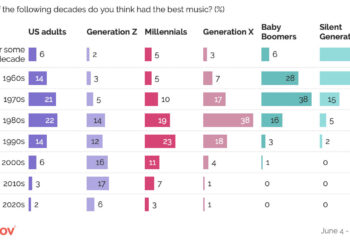Editor’s Note: Today’s post is by the members of The Scholarly Kitchen’s Mental Health Awareness Working Group: Meredith Adinolfi, Charlene Chuquillanqui, October Ivins, Alice Meadows, Ryan Reeh, Dianndra Roberts, Jonathan Schultz, Lillian Wang Selonick, and Adrian Stanley
The Scholarly Kitchen’s Mental Health Awareness Working Group has been active for around six months now. With May designated as Mental Health Awareness Month, we wanted to take a look back at what we’ve achieved, and a look forward to what we are planning for the rest of 2024.
Looking Back
Since launching the series in November 2023, we have published 10 posts (not including this one) covering a range of mental health — some personal (for example, Mental Health Awareness: What is Racial Battle Fatigue? by Maribel Gomez and Put on a Happy Face: A Personal Reflection of Grief and Loss in the Workplace by Holly Koppel), and some research-focused (like these posts by Helene Draux and Marjorie Hlava on the challenges of systematically categorizing mental health). Collectively, the Mental Health Awareness Monday posts have been viewed well over 22,000 times as of the end of April.
Looking Forward
In honor of Mental Health Awareness Month, during May we will be publishing a post every Monday (because May 27 is a holiday for many people, the last post of the month will publish on Tuesday instead). For the rest of the year, we will continue to publish at least one post each month. We have some great topics and writers ready to share with you, including posts by the speakers on recent mental health-related SSP webinars, tips from scholarly comms organizations on supporting mental health wellbeing for your teams, a video interview on imposter syndrome, posts on bullying in the workplace, and more.
Looking ahead, here are thoughts from some of us about what we’d like our working group to achieve in the coming months. We’d love to hear your thoughts and ideas, and we warmly welcome more guest posts!
Dianndra Roberts: It has been a privilege to be part of the Mental Health working group and share my own experience as part of Mental Health Mondays. I hope we continue to engage in conversations around mental wellbeing and how mental ill health can show up differently for everyone. It’s also important to share the experiences of how we can care for ourselves and one another in our personal lives and the industry we are all a part of.
Having a post out every month has been a great achievement for the working group and all who have contributed, as this can be quite a vulnerable experience. I hope to see us, as a community, continuing to share more – what workplaces can do more of and are currently doing to support employees, and how we can be mindful of what our colleagues could be experiencing. Taking a practical look at psychological safety in the workplace and how we can all contribute to a healthy environment. Of course, this will look different for different people, but by starting the conversation we can start to think practically. On a personal level, if one person reads these posts and learns something – changing their behavior and outlook — then it will be a success.
October Ivins: When Randy reached out to the active past presidents last June to see who was interested in brainstorming about an SSP mental health awareness initiative, I was immediately interested. Since retiring six years ago, I have found that, although I enjoyed my work and think I made strong contributions, what I miss is not the work itself, but the people. The SSP community, in particular, was always welcoming and supportive, and I enjoyed the opportunities that committees provided for supporting those new to scholarly communications, to SSP, or both. Since I believe mental health challenges cannot (and should not) be completely separated into personal and professional, or work and personal, this initiative seemed like a significant opportunity for development and sharing.
Once we refined our ideas and set up five working groups, I was happy to be teamed up with Alice and Adrian to lead the group preparing posts for The Scholarly Kitchen. They have current contacts and Alice is also an active Chef. By the autumn, Randy nominated other working group members at various career points from a variety of organizations, and with experience in different SSP activities. We convened the working group in November and I especially enjoy our calls and following the development of ideas and perspectives. We’ve covered a range of topics and can see from the Scholarly Kitchen statistics that even posts that receive few comments are being viewed hundreds and even thousands of times.
We encourage anyone with a topic or author to suggest to please contact one of us. We can support anonymous posts and are also looking into using videos, interviews, and group discussions as well as straightforward narratives for future posts.
Ryan Reeh: Like a lot of people, I have been guilty of setting aside my own mental health in favor of other priorities in my life. While this helps productivity in the short term, in the long term all it accomplishes is chipping away at myself until the issue forces me into a down period. My interest in joining this work group was getting practical advice from real experts on such mental health issues and giving voice to topics that, while we all may be thinking of them, haven’t really been given the time of day.
In that spirit, look for an upcoming Mental Health Awareness interview with Sarah Durrant, an expert on contending with imposter syndrome, who has been featured on the BBC and has done a series of talks on the subject. The working group is also working on scholarly publishing-specific angles and context in mental health, and on sharing worksheets, resources, and experiences from industry peers that you might be able to apply in your own workplace or to help you as an individual.
We would welcome any suggestions or feedback on mental health posts past, present, or future. There is no stigma too great nor topic too much for us to consider — you never know if something you’re thinking about could potentially help a colleague or friend. It is our sincere hope that this mental health initiative is more than just a feel-good exercise and helps shine a light on this under-served area.
Adrian Stanley: I’m so pleased at the responses the working group has had in soliciting Scholarly Kitchen posts, and the bravery of people willing to share their stories and experiences (look out for Sharnie’s Duntstall’s upcoming post later this month, Building a Supportive Workplace: Reflections on Mental Health Initiatives and Adaptation). I find when people do open up and share, there’s both a ripple effect, that others share and align, and a greater awareness and understanding of the issues.
To address an elephant in the room, someone asked online why SSP isn’t addressing some of the fundamental publishing issues like research integrity, issues with AI, revenue diversification, OA business models, etc. My answer to this is that there’s room for all these discussions in our community, and I really applaud Randy for bringing mental health awareness forward on all our agendas.
A final call also for possible blog contributors — we are drafting an Ask the Mental Health Journal Editor post. If anyone you know is willing to answer a few simple questions, and talk a bit about the work their journal is doing in the mental health field, we’d love to hear from them.
Meredith Adinolfi: When this Mental Health Awareness Working Group first convened, I was struck by the diversity of ideas that came from our brainstorming session. It was immediately clear just how much there is to cover on the broad topic of mental health in our industry. As we’ve developed these potential posts further, the topics have become even richer, and I’ve begun to see a cohesive picture of separate but related and interconnected discussions.
Something I’m looking forward to seeing in a future post is the perspective of what it’s like to come into this industry with an educational or professional background in psychology, counseling, or any other area related to mental health. At first glance, that kind of background doesn’t seem immediately relevant to the work we do, but I’ve found that it very much can be, as we try to navigate the active and dynamic world of scholarly publishing while also dealing with the ever-changing landscape of what it means to be a professional (individual or manager) in the current world.
I’m also hoping that we can explore some of the stigmas that still exist around seeking help for whatever we might be facing. We’ve come a long way in normalizing therapy, counseling, and other types of support and in talking openly about mental health, but we still have work to do. I look forward to more discussion about how to make further progress as well as how to ensure that we’re using language that makes us all feel supported and understood.
Thanks to Randy for getting this initiative started and to all those who have contributed so openly and generously thus far. I know it’s not easy, but these topics are important and relevant to so many of us.
Charlene Chuquillanqui: I’m grateful for the opportunity to be a part of a working group that is made up of such dedicated and thoughtful members. I think the diversity of posts published so far illustrates the nuances of mental health topics and sheds light on the ways mental health looks differently for everyone. I hope these posts can be affirming resources that allow the writers and readers to be seen, heard, and appreciated. Mental health challenges can often feel isolating, and it is our goal that readers can resonate with or deepen their understanding and compassion for the experiences of others. From spotlighting personal stories to sharing insightful research-based posts, I hope we can encourage offering a listening ear to one another and normalizing conversations around mental health — which can often be minimized or ignored.
As someone who is still somewhat early in their publishing career, I’ve appreciated a focus on showcasing ways organizations and leaders can offer support and cultivate the kind of empathetic environment that allows individuals to be able to show up as they are. In many ways, leadership sets the tone for a healthy working environment. It’s important to share information and guidance on what is being done or could be done at the leadership level to foster a supportive culture that allows people to thrive, in addition to providing resources on ways we can all prioritize our mental well-being in the workplace and out. I look forward to our group warmly welcoming more perspectives, feedback, and resources to illustrate how mental health challenges and research exist within the context of our scholarly publishing community.
Jonathan Schultz: It’s commendable of SSP and Randy to highlight the importance of mental health and recognize it as a crucial component of overall wellness. If you have ever had to navigate your health insurance to get mental health services covered (or find out they aren’t), you’ll know how undervalued it is. And yet, I’ve seen many careers in scholarly publishing affected by mental health where colleagues have changed jobs or even left the industry over burnout, stress, or other concerns. They’ll half-jokingly say they are doing it to “protect their sanity”, but why does it always seem that when it comes to mental health, the individual has to change but not the organization? If you found out your job was poisoning you, you’d be rightly outraged, but people routinely shrug off “toxic” work environments as something that has to be personally dealt with. It’s my hope that by prioritizing and raising awareness about mental health issues in the workplace, SSP and the Mental Health Task Force can help promote discussion and effect meaningful change that will improve scholarly publishing for everyone.
Lillian Wang Selonick: It is an honor to be able to contribute to the productive and creative discussions of this working group. I have always been impressed by the quality of community that SSP has built, and the Mental Health Task Force is taking that passion and commitment to a much-needed new frontier. By bringing these long-stigmatized topics into the open on The Scholarly Kitchen, it is my hope that we as an industry can confront the conditions that lead to burnout and employees suffering, unsupported, in silence.
I am particularly inspired by the intersectional lens that the group is bringing to the series, thanks in large part to the strong leadership from Dianndra and Randy. We each cannot help but bring a multiplicity of identities into the workplace, and learning how to navigate that while protecting our boundaries and mental health is an immense challenge for many of us. Shedding some light on the personal experiences of others can help make that struggle feel less lonely.
Alice Meadows: There’s not a lot I can add to what my fellow working group members have said, other than to thank them all very much for their willingness to serve on this group and their thoughtful contributions to our discussions. I very much echo their appreciation of the many guest post authors who have shared their experiences – often in ways that are both personal and inspiring – and our collective gratitude to Randy for his leadership. During his time as President, he has not only identified mental health as a topic that SSP should prioritize, but also led by example through his commitment to helping us find great authors and topics for our Mental Health Awareness Mondays posts. I’m looking forward to continuing to work with the working group to publish posts that reflect a wide diversity of perspectives on mental health issues – your ideas are very welcome!



